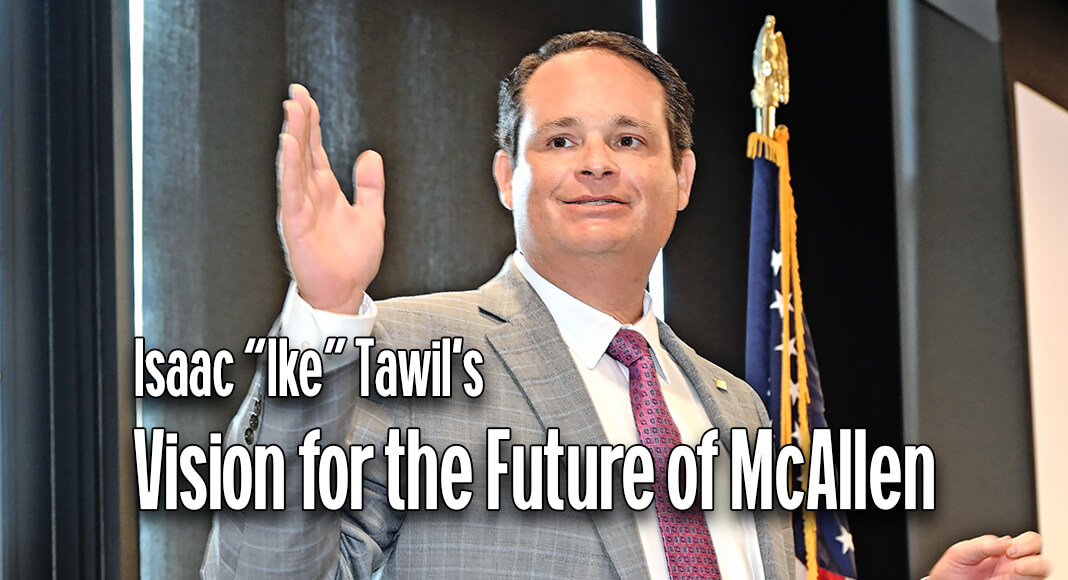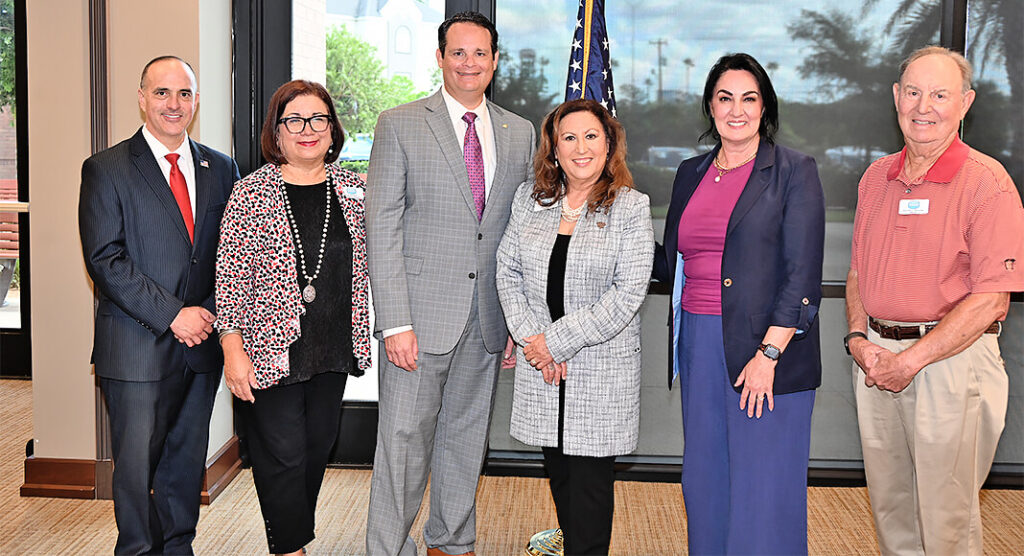
Texas Border Business
By Roberto Hugo González
The McAllen Citizens League (MCL), under the leadership of Elva Cerda and other dedicated community leaders, has long promoted active engagement and dialogue within McAllen, Texas. Recently, the MCL hosted newly appointed City Manager Isaac “Ike” Tawil, who outlined his forward-thinking vision for McAllen at an event titled McAllen City Manager Isaac “Ike” Tawil’s Vision for the Future of McAllen. This presentation gave residents insight into Tawil’s ambitious goals to transform McAllen through “sustainable growth, modernized infrastructure, and stronger cross-border partnerships.”

Isaac Tawil’s approach focuses on economic planning and collaborative governance, aiming to lead McAllen into a new era of growth and regional influence. Tawil sees McAllen as a “dynamic intersection of trade, tourism, and culture,” positioning it as a future metropolitan center. His strategic approach emphasizes “community-oriented governance and targeted investments,” reflecting McAllen’s unique position as a growing border city with metropolitan ambitions.
Stepping into his role after Roel “Roy” Rodriguez, Tawil now manages McAllen’s $650 million budget, overseeing crucial projects, including the McAllen International Airport, two international ports of entry, and multiple cultural venues. At the MCL event, he outlined his main priorities: “economic development, infrastructure, cultural advancement, and governance.”
Tawil pointed to significant developments, noting that the McAllen Economic Development Corporation (EDC) is “actively working to bring major industries to the city” — a move that could drive substantial economic growth. He also mentioned plans to revive the EB-5 investor visa program, an initiative he believes will “bring international investments and new opportunities for McAllen.”
Key to his administration’s strategy is collaboration with local institutions like the University of Texas Rio Grande Valley. “The partnership with the university exemplifies what my commission emphasizes daily: we must collaborate to meet the needs and aspirations of our community,” Tawil stated. Recognizing that McAllen is at a pivotal moment, he noted, “We’re on the verge of becoming a true metroplex if we’re not already there.”
Economic development forms the foundation of Tawil’s strategy. Given its “strategic geographic position,” he envisions McAllen as a prime location for business ventures. Tawil is committed to modernizing McAllen’s infrastructure, particularly its water and sewer systems, to prepare for industrial projects and population growth. Recently, the city secured a $25 million federal grant for cargo expansion, which he describes as “a critical step in establishing McAllen as a key trade hub and attracting international business.”
Infrastructure modernization also plays a central role in Tawil’s vision. The expansion of McAllen International Airport to double gate capacity and improve parking facilities reflects his focus on “addressing rising passenger demands.” Tawil highlights the importance of McAllen’s international ports and is “actively pursuing funding for these expansions.” With nearly half McAllen’s budget allocated to capital projects, Tawil emphasizes “balanced, forward-looking investments,” including expanding U.S. Highway 83 to accommodate the city’s growing transportation needs.
Tawil is also dedicated to cultural and recreational development to enhance McAllen’s quality of life. New projects, like a campsite featuring walking trails, archery, and canoeing, will make green spaces more accessible to residents. He envisions McAllen as a cultural hub, with plans to expand programming at the convention center and performing arts venues, which already draw “over 600,000 visitors annually.” He explains that events like the South Texas Book Festival “showcase McAllen’s appeal as a cultural destination.” Free symphony concerts and similar initiatives underline his commitment to accessible arts as “essential to life in McAllen.”
As McAllen adapts to its growing metropolitan status, urban development and housing improvements are also priorities. Tawil and the City Commission are leading an update to the city’s Unified Development Code to modernize zoning, promote mixed-use developments, and create “a walkable, transit-friendly urban core.” Collaborative projects with the University of Texas Rio Grande Valley will “enhance housing and create professional growth opportunities, benefiting community facilities and residents alike.”
Tourism and international relations are essential to Tawil’s approach to expanding McAllen’s reach. He aims to make McAllen a “destination city,” particularly for Mexican nationals looking for business and leisure. Tawil envisions a rise in hotel occupancy and support for local businesses, adding, “Our city’s identity as a destination is only growing.”
At the heart of Tawil’s leadership is governance and community engagement. His focus on effective budget management ensures resources are used strategically for the city’s growth while keeping debt minimal. Emphasizing transparency, he plans to host regular town halls, inviting residents to participate in discussions about McAllen’s future. “Engaging our community is essential to shaping McAllen’s future,” he affirmed.














